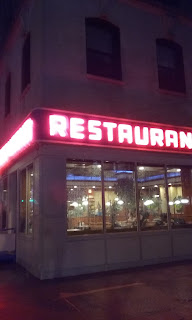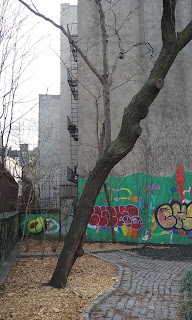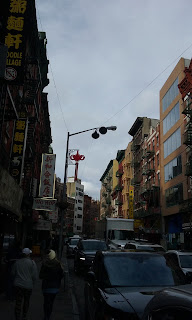

New Yorkers pass their winters in countless ways.
We look out our windows as the snow flutters through
the air, then turns back to rain, then to show.
We organize, we write, we hibernate, we teach, we
read, we hang out in clubs, we go to book events and dinner parties. We huddle
in from the storms. But mostly we talk. That’s what I’ve been doing with my friends and
family the last few weeks. Lots and lots of talking and organizing.
On the way home from the Supreme Court last week, we
talked for hours and hours. It looked
like capital was poised to consume one of labor’s biggest legacies, the
capacity to build a collective structure for our demands.
So we talked about what it all could mean, what was at
stake, and what we could do to keep members engaged. Much of this starts conversations, the kinds
of conversations the dreamers are having in DC and the strikers are having in
West Virginia, conversations about ways to build a better world.
“The teachers' strike
in the populist revolt against neoliberal Democrats and state austerity policies,”
noted Steve.
For many, these conversations began decades ago, back
in the days of the draft, when regular people were finding ways to evade going
to the Viet Nam War.
On the bus home from DC, Mike told stories about prepping
for the meeting with the draft board.
George told me about his favorite stories, reading As
I Lay Dying with his book group.
We all stared stories of our favorite novels, of Lincoln in
the Bardo by George Sanders.
Mike suggested we review 2666 by Robert Bolaño.
I talked about Aunt Julia and Stephen
Vizinczey’s In Praise of Older Women.
We talked all afternoon, about this story and that. The Hare with Amber Eyes: A Hidden Inheritance by Edmond Dewaal,, James
John, This red line, from here to eternity, Kris Kristpherson, and Waiting for the Barbarians byJM Coetzee.
Before we knew it, we were in New York, and I took
another call, chatting as I walked across the Brooklyn Bridge on the way home.
All week long people shared ideas.
Ravi talked about the parable
of The Good Samaritan and challenging our unjust immigration system through
selfless love. Asking who is a
neighbor, the story feels particularly resonant in light of the Supreme Court’s recent decision to allow indefinite
detention (Jennings v. Rodriguez).
The room at Judson Memorial Church was buzzing with energy as he spoke. Afterwards, we walked outside to express
solidarity with the thousands of immigrants who are incarcerated and hidden in
immigration jails around the United States, separated from their families,
friends and communities.


 |
And we walked over to Little Poland to eat pierogi’s.
On Friday, a few Brooklyn artists talked about the
message from the waters along the Brooklyn waterfront. How does place-based art along
the waterfront enrich our Brooklyn communities? Each talked about what draws them to the waterfront
and how that place informs their art.
Yet,
what is the water is saying to them as they did the garbage, creating art from
the rubble and pollution. Enough they seem to be
telling us over again, enough. The tides pouring through Brooklyn are many. We’ll continue this at our book talk on March 27th.
The murals in Bushwick remind of us of the ways we can
connect with each other, that cities can be works of art.
The drag performers at the House of Yes remind us that
burlesque stories tell us a great deal.
Greg gave a talk about the lines between cause that do
not necessarily connect with effect.
A few of us met at the Commons where we read through
Capital again and again on Saturday, reflecting on it Sunday as we walked
through the East Village.
It had been a hell of a weekend, traipsing up to the Upper
West Side during the Friday Nor’easter and through Brooklyn on Saturday.
Sunday friends came over and everyone talked about Mao
and China.
Our president wants to emulate their autocratic model.
"He's now president for life. President for life,” he explained. “And he's great. And look, he was able to do
that. I think it's great. Maybe we'll give that a shot some day.”
“I am looking at the long game,” noted Steve.
“The kids are turning things around,” another argued.
And many of us are starting to wonder about what kind
of a system we live in.
“Its not a democracy,” Carolina reminded us.
I thought about a conversation as it snowed outside a
few weeks prior.
A friend told me about evading the draft decades ago.
When I came back from my draft physical. Hiding in my
house. My father was looking at me at the pin in my ear. It was upsetting to him. I spent two weeks taking speed, diet
pills. I was playing in a band in Dolorous
Hotel, Dexedrine. And then I came into
the city for a couple of days before I had to go take the physical. So I met this base player who gave me vials
of liquid meth amphetamine, like crystal meth.
For two weeks, I took diet pills so I wasn’t eating. Through Donny knew
someone who knew someone who got me the liquid meth. I took them in two days. I stopped the morning I was going to the
physical. When I went for the physical
on Whitehall street. I topped it all off with hash. I went from 225 to 175 lbs in two weeks. And then I’m wearing the same cloths. So I looked at myself in the morrow and the
whites of my eyes were a crusty yellow.
I was feeling so good. So I go
down. I’m thinking for sure I’m going in the army. Everyone had something
figured out. I didn’t think it was
enough. You go down there. You’re in one
room. They give you an envelope. And my friends had managed to not get past
that room. One friend just threw up on
the table when he went in. My friend
Donny walked up. They didn’t ask him a
question. They looked at him. And they sent him home. I had one friend who
didn’t talk, he just played his saxophone.
So they drafted him. He got a
1A.
So I get to the pre induction physical. I’m feeling good, literally boxed out of my
brains. You go up. You give em to someone. They give question. Do you do use drugs. Yea, I do drugs. Pot, hash, not enough to get
you out. They said do you like girls. No more than boys. That was enough to get me to the
psychiatrist. They sent me to the psychiatrist.
Walk in and there is this room, all these booths. I saw people I knew from Julliard. I saw the
psychiatrists talking about me. I’m
staring out the window. They wrote down,
he is staring out the windows. They said do you do drugs. I said yea.
Why cause my friends do. They
said don’t you know you’ll be in the band in west point. I said I can’t. they said I was not fit to
serve the usa. They gave me two tokens
and a meal pass. And I had to register
with the board of health. They called
me. I said there is nothing wrong. This is a shit war.
The classifications they had 1A, fit to serve, 1Y,
deferment, and others 4F. So I thought I would be 4F. I guess because I came from Monticello,
rather than classify me 2 something and I didn’t have 4f on my record. And they
never called me for another physical. This was probably 1967. I’m finally in bed asleep. And here I have these crusty yellow eyes and
black eyes. And my dad and I had a long discussion. He looks at me. I said didn’t you put a pin
in your ear to get out of the Russian army.
At least I got to get high. I
wasn’ t suffering.
So the base player who I got the meth amphetamine, we
used to use crystal meth, dissolve it in the water and drink it all day.
When I think back to it, I think the path. When I play the base clarinet now, I think
about my days when I was at Julliard I was as good as anyone. I can flash back
to those days…
It was all part an ever-evolving history of music and
art that grew out of that space.
My senior year I took a crazy number of classes. I was looking forward to going to Freedonia
teachers college.
But I ended up going to Julliard as a saxophone, where
you were spit on. There was no rock roll,
no jazz. The orchestra looked down on
you. So I looked around, chased dancers,
etc. But I looked and said I gotta be in the orchestra. There were no bassoon players. That summer when I got home. I spent the summer learning to play the
bassoon. They had recruited bassoon players when I got back. That was out. When
I was a freshman and Ida said you gotta get him out of here. So I moved into an apartment. Ida, Seymore,
and I lived together on the upper west side in a one bedroom apartment.
And finally, I found the base clarinet to get through
as a BN, bachelor of music.
The clarinet
and sax I stopped playing music.
I studied Buddhism for two years.
And I was a working
musician and rock and roll started to filter in. Music became secondary to Buddhism. 1966 6-
67. I moved to Houston, east of A, empty blown out. The block between A and First Avenue, that
little house, that was the synagogue. The projects were still there on first Ave. Nothing was good. Unless you went east of B, it was harried,
the block between and a and b. the b
side of the park on Tompkins square was harry.
West of it was fine. You walked West of the Hells Angels headquarters.
Debbie harry was living with a friend of mine gil. She was a waitress at Max’s at the time. They were living, had an apartment on first
street, that were motorcycle gang. They used to ride their bikes up the steps,
They kept an apartment, tied em to chairs, set the apartment in fire. Gil and Debbie lived below. They get a knock on the door. This guy is standing in a chair. I gave gil and Debbie my apartment and moved
in with your mom. She became Blondie.
Rock and roll and Vietnam changed things.
My last year in Julliard 1965 going into 1966, that’s
when the anti Vietnam. My friends had
known the kids killed in Mississippi. We
were more concerned with civil rights, more than Vietnam. We all hated LBJ. We thought he killed Kennedy.
New York stories grow out of the snow, the subways, the tree, the gravestones, the dinner parties, the coffee at breakfast, the memories at night.
These stories go on forever and over.





































































































































No comments:
Post a Comment